By Robin Wilson, Ph.D.
I wasn’t sure what I was getting into when I decided to retire from being a campus principal to return to school to complete my doctorate. I have always loved to learn, and I knew I was ready to embark on a new journey…even though I was a little late in life to be pursuing a Ph.D. While pursuing this degree, I ended up focusing on how to better educate our local high school seniors, teachers, and administrators on what it takes to be college and career ready. There are personal skills, such as time management, study skills, self-awareness, and persistence, required. There are also academic classes, such as dual credit courses or AP (Advanced Placement) courses, that will help prepare a student for college or a career. But, in 2018, the Texas Education Agency (TEA) added a new term and a new standard of expectation for graduating seniors: CCMR.
What is CCMR?
To better meet the expectations of the 60x30TX, TEA expects all seniors, beginning with the class of 2018, to be College, Career, or Military Ready (CCMR). Each graduating student must meet at least one of the following to be considered CCMR:
College Ready
- Earn at least a score of 3 on any Advanced Placement exam or at least a score of 4 on any International Baccalaureate examination
- Meet Texas Success Initiative (TSI) minimum score requirements in reading and mathematics*
- Complete a dual credit course/courses (earning at least 3 hours in English or Mathematics OR at least 9 hours in any subject)
Career Ready
- Earn an industry-based certification
- Complete a Career/Technical Education (CTE) course aligned with an approved industry-based certification
- Graduate with a completed Individualized Education Program (IEP) and workforce readiness (for certain students served through special education programs)
Military Ready
- Enlist in the United States Armed Forces (Army, Navy, Air Force, Coast Guard, or Marines).
While TEA gives students a variety of ways in which to meet the CCMR, many of these methods will not be known to students (like the TSI or available industry-based certifications/CTE courses aligned to certifications) nor will it be known to students that they should report to their schools if whether they enlist in the US Armed Forces. Therefore, everyone needs to be more familiar with this new requirement.
What is TSI?
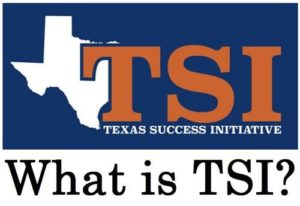 The TSI (Texas Success Initiative) is the placement test used by colleges and universities to help determine if your child is ready for college-level courses. Although your child can be “admitted” to a higher education institution based on his or her ACT or SAT scores, “placement” in college-level coursework will depend on his or her TSI scores. If your child does not meet the standards or exemptions below, he or she will be enrolled in a developmental education program designed to help him/her become college ready. These developmental courses do not count for college credit, but your child will still have to pay the cost of enrolling in these college-level courses.
The TSI (Texas Success Initiative) is the placement test used by colleges and universities to help determine if your child is ready for college-level courses. Although your child can be “admitted” to a higher education institution based on his or her ACT or SAT scores, “placement” in college-level coursework will depend on his or her TSI scores. If your child does not meet the standards or exemptions below, he or she will be enrolled in a developmental education program designed to help him/her become college ready. These developmental courses do not count for college credit, but your child will still have to pay the cost of enrolling in these college-level courses.
Minimum scores on TSI to be considered-college ready:
- Mathematics: 350
- Reading: 351
- Writing: a placement score of at least 340, and an essay score of at least 4: OR a placement score of less than 340 and an ABE Diagnostic level of at least 4 and an essay score of at least 5.
Exemptions from the TSI Reading/Writing assessment can be earned based on ACT/SAT scores or course completion:
- Score a 23 or higher composite on the ACT and a minimum of 19 on the English section
- Score 480 or higher on the SAT Evidence-Based Reading and writing section (no composite score needed)
- Receive credit for completing the College Preparatory English course
Exemptions from the TSI Mathematics assessment can be earned based on ACT/SAT scores or course completion:
- Score a 23 or higher composite on the ACT and a minimum of 19 on the Mathematics section
- Score 530 or higher on the SAT Mathematics section (no combined score needed)
- Receive credit for completing the College Preparatory Mathematics course
What do these new standards mean for our school districts?
These new standards change the expectations for graduating seniors and how our high schools will receive their “A-F grade” from TEA (https://tea.texas.gov/A-F). The elementary and middle school campuses’ grades from TEA will still be based on STAAR test scores (100%), but high schools will now be graded on STAAR scores (40%), CCMR rate (40%), and graduation rate (20%). This new accountability for high schools will take the work of a village to ensure that all of our seniors graduate ready to pursue a degree at a higher education institution or move into the work force career-ready.
How can parents help make sure their child is college and career ready?
Parents can help in numerous ways:
- Encouraging your child to not only take dual credit or Advanced Placement courses but also perform well in those courses and on their exams;
- Reminding your child to take his or her opportunities to take the TSI seriously and to study any practice materials available for the TSI;
- Aiding your child in finding opportunities to earn an industry-based certificate (if their goal is to be career-ready) through participation in CTE courses, the Greater Waco Advanced Manufacturing Academy or the Greater Waco Advanced Health Care Academy;
- Urging your child to utilize the college planning guide.
Your local high schools also need you to help educate your neighbors about CCMR. The new standards can be conquered, and our high schools can continue to provide our students with skills and knowledge necessary to be successful, but it will take the work of a village. Help spread the word in our community on what it takes to be college, career, or military ready!
 Dr. Robin Wilson is the College Readiness Coordinator and AVID District Director for Waco Independent School District. She earned her Masters degree from University of Texas at Tyler and her Doctorate at Baylor University. She has worked as a classroom teacher, campus principal, a district administrator, an AVID professional development staff member, and a university adjunct professor.
Dr. Robin Wilson is the College Readiness Coordinator and AVID District Director for Waco Independent School District. She earned her Masters degree from University of Texas at Tyler and her Doctorate at Baylor University. She has worked as a classroom teacher, campus principal, a district administrator, an AVID professional development staff member, and a university adjunct professor.
The Act Locally Waco blog publishes posts with a connection to these aspirations for Waco. If you are interested in writing for the Act Locally Waco Blog, please email [email protected] for more information.
By Scott McClanahan, Ed.D.
In the spring of my senior year, I noticed a trend amongst my classmates: they were all discussing college incessantly. I, however, was not. As the son of a factory worker and a retail sales clerk (neither of whom attended college), I was not having those discussions at my house. I had not met with my guidance counselor for college advice nor had I been approached by any outside entity to help me navigate the college process. My sole source of information was the copious college propaganda that arrived in the mail each day. Impressed by beautiful pictures, stories of campus activities, and lists of amazing opportunities available at the various institutions, I tried to determine where to go, even though I knew my family did not have the financial resources for me to attend. It was not until April of my senior year that I decided on a state school 90 minutes from home; however, by that time, the dorms were full nor had I been awarded financial aid, forcing my parents and me to navigate the worlds of off-campus housing, financial aid, payment plans, and books on our own.
But that was 30 years ago. And we hope — for the large majority of today’s students — circumstances are different. However, an occasional student still moves through the high school system and never receives the message that college is both valuable and available, despite any hardships possessed.
As President of the Heart of Texas P-20 Council, I can confidently state that administrators around the region sponsor fantastic College Readiness programs to assist their students: college and career fairs to motivate students to pursue higher education, college testing (such as ACT, SAT, and ASVAB) preparation that opens opportunities at higher education institutions or in the military, and specialized career preparation classes. From rigorous Career and Technical Education programs, to Advanced Placement and Dual Credit course offerings, to Early College High Schools and early degree programs, our region is leading the charge to impact every student. Today’s local students find it increasingly more difficult to make it through to high school graduation without ever hearing about college, without receiving information about paths to college, or without their post-graduation plans being questioned (usually multiple times).
These conversations are part of our region’s efforts to meet the requirements of the State of Texas’s 60x30TX initiative, an enterprise to keep Texans competitive in the global economy. The 60x30TX initiative has four goals: increase the education level of Texas’s 25 to 34-year-old population; increase degree completion levels at Texas community colleges and universities; increase the marketable skills possessed by high school graduates; and decrease the amount of student debt accrued by college graduates. The state’s fifteen-year strategic plan encompasses these four goals, all to be achieved by 2030. Although formidable, all are attainable with intense, directed action on the part of K-12 systems, higher education institutions, and the community.
The first goal seeks to increase the number of adults ages 25-34 statewide who hold college degrees (2-year or 4-year) or national workforce certifications to 60% by 2030. In an age where the American Center for Progress reports that one in eight Americans lives in poverty, this type of goal is required. A 2012 Brookings Institute study identified two common characteristics of prosperous communities: residents either held a college degree or had earned a workforce certification, and explained this finding economically in a 2015 report: adults aged 25 to 34 who finish college degrees not only earn more annually but also contribute more to the local economies, causing the whole community to flourish. Similarly, specialized certifications allow workers access to a set of higher-paying jobs. Therefore, the goal makes good sense for all of us. However, the 2018 Texas Public Higher Education Almanac reports that in 2016 (the most recent available data) only 42.3% of Texans 25-34 held a degree or certification. Therefore, it is in all our best interests to encourage the young people in our lives to pursue one of these avenues.
The Heart of Texas P-20 council, whose focus is to collaborate, inform, and advocate for seamless pipelines from prekindergarten to career, engages local K-12 systems Waco ISD, Midway ISD, LaVega ISD, and Connally ISD, local charter schools Harmony and Rapoport, higher education partners McLennan Community College and Texas State Technical College, Prosper Waco, and numerous business representatives in active communication to remove barriers that might exist that prevent students from helping the state to achieve these strategic goals. And, our earnest work toward this mission is seeing results.
At last Tuesday’s McLennan Community College graduation, Rapoport Academy and Waco ISD graduated 13 students with associate degrees before these students had even graduated from their high school.
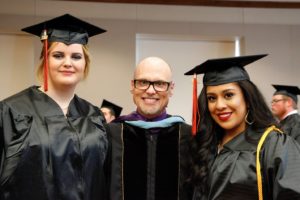
Waco ISD’s two associate degree graduates with me: Kiara Jackson, Waco High School, and Isabella Lozano, University High School. These young women have both claimed the title of first student in their high schools to graduate with an associate degree.
One Waco High School student, Kiara Jackson, achieved this feat in only three years—graduating from high school a year early and from her associate program three years ahead of schedule. The students completed these degrees at no cost to themselves, helping to meet the state’s fourth strategic goal of reducing student debt levels. These students avoided costs by participating in programs offered at their high schools that are free of charge. Rapoport Academy’s Early College High School and Waco ISD’s ACCELERATE Early Degree Program are just two innovative ways that regional educators are creating options for our students to eventually earn more as workers and contribute to their communities at higher levels as consumers.
Questions about these types of programs can easily be answered by a high school counselor or current participant; however, three main misconceptions tend to keep students from taking advantage of these types of opportunities:
How does a student have time to meet all the high school graduation requirements and complete a college degree at the same time? Do they have a longer year, go to night school, or have to attend during the summer? – “Dual credit” classes allow students to earn both high school and college credits at the same time. For example, MCC’s History 1302 can be taken to fulfill both the required credit for high school US History and to complete the U.S. History course requirement for any degree issued at a Texas public college or university. Therefore, with smart planning, students can complete classes that earn credit towards high school graduation and a college degree.
How does a student know what classes will be accepted by universities, particularly out of state? Who will help them navigate that? – McLennan Community College advisors are extremely knowledgeable about transfer credits and acceptance of classes. Advisors are required to meet each semester with students prior to enrollment, once two classes are completed. During this advising, they will ask students what schools interest them and what their anticipated majors will be. From that, advisors will determine the best classes for the students. Parents and students can always verify transfer policies for any college by calling the transfer coordinator (whose name can be found on the college’s website) to discover how transfer coursework will be accepted once the student is admitted to the university.
Does this type of program keep students from participating in other school activities? – Because students are accelerating their instruction (sometimes by up to four grade levels), they should consider limiting participation in some activities, especially those that cause them to miss school frequently or require long practice hours outside of the school day. Since grades in these courses impact the students’ high school and college GPAs, an overloaded schedule many times will avert focus from academics (or cause students to have tremendous worry about those academics) and performance suffers. This does not mean students must give up all extra-curricular activities. They can participate in activities such as band or choir, sports, and clubs; however, they should make wise choices when investing time and carefully evaluate the time commitment required of each activity before committing to it.
Perhaps if these types of opportunities had been offered when I was a senior, I would have taken advantage of them and saved myself a great deal of time, money, and stress. We have programs to help increase college access throughout our community—Communities in Schools, VOICE, Project Link, just to name a few. Parents who did not attend college should not feel embarrassed about asking for guidance on how to help their children navigate this process. We are all in this together: schools, businesses, the P20 council and the State of Texas. Together, we can meet the state’s challenge and meet its lofty goal, while simultaneously helping to make Waco a more prosperous community.
 Dr. Scott McClanahan is the Executive Director of Secondary Curriculum and Instruction for the Waco Independent School District. Originally from the Chicago suburbs, Dr. McClanahan moved to Texas to earn both his Masters degree and Doctorate. He has been a middle school and high school teacher, a community college professor, and a university adjunct professor.
Dr. Scott McClanahan is the Executive Director of Secondary Curriculum and Instruction for the Waco Independent School District. Originally from the Chicago suburbs, Dr. McClanahan moved to Texas to earn both his Masters degree and Doctorate. He has been a middle school and high school teacher, a community college professor, and a university adjunct professor.
The Act Locally Waco blog publishes posts with a connection to these aspirations for Waco. If you are interested in writing for the Act Locally Waco Blog, please email [email protected] for more information.
By Larry Carpenter
“‘Cause a little bit of summer is what the whole year is all about’.” These lyrics from pop singer John Mayer’s song, “Wildfire,” ignite a spark of anxiousness as the end of the school year inches closer and the summer months draw near—especially for students who have worked hard in the classroom all school year long reading, writing, testing, and growing their minds and bodies.
As a student, I remember so vividly how the looming summer vacation from school would bring opportunities to be outdoors, attend summer camps, go to the swimming pool, or even just mow the lawn and smell the fresh cut grass. The length of the sunny days would unfold and give rise to something new and challenging everyday. And when the Texas heat grew too hot to be outdoors for long periods of time, it was important to have activities indoors to keep me occupied and engaged.
 That is where the Hawthorne Youth Center came into play for me. The HYC was a very small, community-based summer activity center in my old hometown. Owned by a local family, giving back to local kids was priority number one. Just a three-quarter mile bike ride from my front door, the HYC provided creative, athletic, educational, and social activities and events for youth of all ages. It was there that I not only learned the value of being part of a team, but I learned the value of social interaction, developing confidence to start conversations with others I didn’t already know. I enjoyed those summers at the HYC, and I was so very thankful that my school let the group promote their summer camp so that my family had the opportunity to let me go and grow.
That is where the Hawthorne Youth Center came into play for me. The HYC was a very small, community-based summer activity center in my old hometown. Owned by a local family, giving back to local kids was priority number one. Just a three-quarter mile bike ride from my front door, the HYC provided creative, athletic, educational, and social activities and events for youth of all ages. It was there that I not only learned the value of being part of a team, but I learned the value of social interaction, developing confidence to start conversations with others I didn’t already know. I enjoyed those summers at the HYC, and I was so very thankful that my school let the group promote their summer camp so that my family had the opportunity to let me go and grow.
It’s not very different for kids today. As we move closer to the close of the 2018 school year, students and their parents will be looking for activities to occupy their time in creative, fun, and educational ways.
In an effort to highlight many of the amazing opportunities available to families in the Waco area this summer, the Waco ISD Department of Student Services and Family Engagement is sponsoring a Summer Showcase on Saturday, May 5, 2018 at the Mayborn Museum from 9:00 a.m. to Noon.
Organizations, clubs, companies, and non-profits, among others will be sharing information about summer camps, student-centered activities, and other summer happenings at the Showcase. Whether you are looking for artistic outlets, growing a garden, developing leadership opportunities or just finding a way to keep cool in the summer heat—the Summer Showcase is the place to explore all your options. Many of the events and offerings are free or low-cost, and the Summer Showcase is a perfect time to find out what’s going on in our community this summer.
At the Cinco de Mayo themed event, families will enjoy food catered from George’s Restaurant, get free prizes from the various organizations represented, be entertained by a variety of activities and performances, and most importantly, get information on summer activities for youth of all ages.
The event is open to all of the Waco area community. It is never too early to see what’s happening in the community to help you make the most informed plans for the summer.
As the hard work of another school year comes to an end, it reminds me so fondly of my summers at the Hawthorne Youth Center and what a difference those experiences had in my life.
Waco ISD hopes to share some of those exciting opportunities to the community through the Summer Showcase! So, we hope to see you on May 5 at the Mayborn Museum from 9:00 to Noon!
Happy Summer everyone!
 Larry Carpenter is the Director of Fine Arts for Waco ISD. Having been with WISD for 18 of his 24 years in education, he has served WISD as a teacher, assistant principal, principal, assistant director of Advanced Academics and now Director of Fine Arts.
Larry Carpenter is the Director of Fine Arts for Waco ISD. Having been with WISD for 18 of his 24 years in education, he has served WISD as a teacher, assistant principal, principal, assistant director of Advanced Academics and now Director of Fine Arts.
By Aranza Torres and Jon Singletary
With a commitment to inspiring, guiding, and connecting young leaders in Waco ISD, Superintendent Marcus Nelson introduced the first Empowerment Summits for Young Men and Young Women. Campus staff and administrators identified approximately 450 students in grades seven through 12 as future leaders from seven Waco ISD campuses.
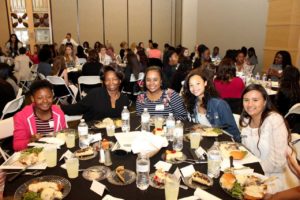 Students had the opportunity to hear from local experts in the medical, legal and educational fields on topics ranging from managing stress, social media, sexual violence, college access and leadership development during panel-style discussions. At the Women’s Empowerment Summit, Jolanda Jones, a Houston ISD trustee, former city council member, author, attorney and former All-American athlete and member of the United States track and field team, served as the keynote speaker. Jones was also a former contestant on “Survivor” and star of WEtv’s “Sisters in Law.”
Students had the opportunity to hear from local experts in the medical, legal and educational fields on topics ranging from managing stress, social media, sexual violence, college access and leadership development during panel-style discussions. At the Women’s Empowerment Summit, Jolanda Jones, a Houston ISD trustee, former city council member, author, attorney and former All-American athlete and member of the United States track and field team, served as the keynote speaker. Jones was also a former contestant on “Survivor” and star of WEtv’s “Sisters in Law.”
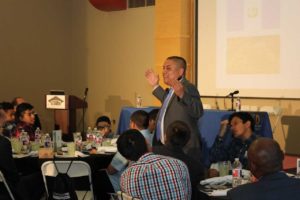 Jaime Carias, the keynote speaker for the men, is the Civic Engagement Coordinator at the University of Southern California Annenberg School for Communication and Journalism. Carias is also a leading urban educator, author and national speaker who is well known for his ability to inspire and educate students of all ages.
Jaime Carias, the keynote speaker for the men, is the Civic Engagement Coordinator at the University of Southern California Annenberg School for Communication and Journalism. Carias is also a leading urban educator, author and national speaker who is well known for his ability to inspire and educate students of all ages.
Approximately 75 men and women from the Central Texas area representing various professions and community organizations volunteered as table hosts to provide a strong leadership presence and facilitate conversations with the attendees. The following reflections are from two of our table hosts. – Robin McDurham, Assistant Superintendent of Student Services & Family Engagement
Empowerment Summit for Young Women
 As a college recruiter, I have the privilege of walking students and families through the transition from high school to college. Occasionally I am given the opportunity to participate in community events such as the Waco ISD Young Women’s Empowerment Summit on February 23rd. As a table host, I had the pleasure of meeting 8 wonderful young leaders who were hand-selected by their campuses to participate in the summit. Our table included students from different campuses and of varying grade levels. It was great to witness them get to know one another, share related experiences and provide advice and encouragement. I was thrilled to hear of the many ways these bright young women demonstrate their leadership through school clubs, dual credit classes, athletics and additional community opportunities.
As a college recruiter, I have the privilege of walking students and families through the transition from high school to college. Occasionally I am given the opportunity to participate in community events such as the Waco ISD Young Women’s Empowerment Summit on February 23rd. As a table host, I had the pleasure of meeting 8 wonderful young leaders who were hand-selected by their campuses to participate in the summit. Our table included students from different campuses and of varying grade levels. It was great to witness them get to know one another, share related experiences and provide advice and encouragement. I was thrilled to hear of the many ways these bright young women demonstrate their leadership through school clubs, dual credit classes, athletics and additional community opportunities.
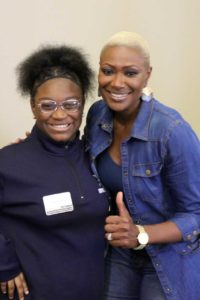 I enjoyed the time I spent with my group and gained new insights thanks to the excellent speakers. The panelists covered a number of relevant topics including; social media, sexual violence and consent, college readiness, stress management and personal development. They were able to offer concrete advice and action steps students could take now. One of my personal highlights of the morning was the keynote speaker, Jolanda Jones, whose powerful and resilient life experiences are a testament to the power of hard work and the importance of finding confidence in one’s self. I feel very lucky to have been invited to the summit and have shared this time with my group.
I enjoyed the time I spent with my group and gained new insights thanks to the excellent speakers. The panelists covered a number of relevant topics including; social media, sexual violence and consent, college readiness, stress management and personal development. They were able to offer concrete advice and action steps students could take now. One of my personal highlights of the morning was the keynote speaker, Jolanda Jones, whose powerful and resilient life experiences are a testament to the power of hard work and the importance of finding confidence in one’s self. I feel very lucky to have been invited to the summit and have shared this time with my group.
 Young leaders are one of the best elements of our school campuses. Recognizing them in our community and investing in them is imperative. Ensuring that they feel supported and heard will serve to encourage their growth. We will look to these young leaders as they move to their next grade level, the college of their choice and contribute to our community. No matter where these young women end up I am confident that they will be hard-working and successful. – Aranza Torres
Young leaders are one of the best elements of our school campuses. Recognizing them in our community and investing in them is imperative. Ensuring that they feel supported and heard will serve to encourage their growth. We will look to these young leaders as they move to their next grade level, the college of their choice and contribute to our community. No matter where these young women end up I am confident that they will be hard-working and successful. – Aranza Torres
Empowerment Summit for Young Men
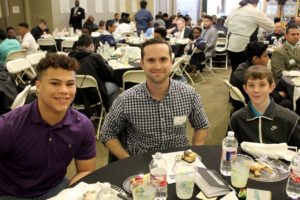 A few weeks ago, I had the opportunity to join a few local leaders on a panel as part of Dr. Marcus Nelson’s inaugural Young Men’s Empowerment Summit. Some eyes may have been on us, the panelists, but our eyes were on the amazing gathering of men in the room that day. Not only did three dozen men from Central Texas, representing a wide range of professions from accounting and law to medicine and ministry, come together in
A few weeks ago, I had the opportunity to join a few local leaders on a panel as part of Dr. Marcus Nelson’s inaugural Young Men’s Empowerment Summit. Some eyes may have been on us, the panelists, but our eyes were on the amazing gathering of men in the room that day. Not only did three dozen men from Central Texas, representing a wide range of professions from accounting and law to medicine and ministry, come together in  support of men’s empowerment, but more importantly were the 200 young men from Waco ISD schools who gathered. As those of us on the panel looked out on that room, we noticed the pride and confidence of the men, and the potential and hope that they represent. Too few young men in today’s culture are invited to reflect on the value of their past and even fewer have a clear expression of hope for their future. On that day, I saw that perspective shift in dozens of middle and high school men. As the panel reflected on social challenges from technology to sexuality, and as our guest speaker, Jaime Carias, shared his own journey of struggle and hope, these young men laughed, their eyes lit up, and they looked ahead at what their lives might hold. And, if this event is a glimpse of the future that Waco has with the leadership of these youth and the leadership of Dr. Nelson, then our future together is bright indeed. – Jon Singletary
support of men’s empowerment, but more importantly were the 200 young men from Waco ISD schools who gathered. As those of us on the panel looked out on that room, we noticed the pride and confidence of the men, and the potential and hope that they represent. Too few young men in today’s culture are invited to reflect on the value of their past and even fewer have a clear expression of hope for their future. On that day, I saw that perspective shift in dozens of middle and high school men. As the panel reflected on social challenges from technology to sexuality, and as our guest speaker, Jaime Carias, shared his own journey of struggle and hope, these young men laughed, their eyes lit up, and they looked ahead at what their lives might hold. And, if this event is a glimpse of the future that Waco has with the leadership of these youth and the leadership of Dr. Nelson, then our future together is bright indeed. – Jon Singletary
 Aranza Torres has lived in Waco for a majority of her life (21 years!). She is a University High School graduate who continued her education out of state at Goshen College located in Goshen, IN. After graduating with a Bachelor of Social Work she returned to Waco to give back to her local community. She is currently a Recruiter and Dual Credit Advisor at McLennan Community College. In her spare time she enjoys being a part of the Waco Immigrants Alliance, Advisor to the MCC Hispanic Student Association, doing puzzles and spending time with her two large pitbull puppies (they’re not really puppies).
Aranza Torres has lived in Waco for a majority of her life (21 years!). She is a University High School graduate who continued her education out of state at Goshen College located in Goshen, IN. After graduating with a Bachelor of Social Work she returned to Waco to give back to her local community. She is currently a Recruiter and Dual Credit Advisor at McLennan Community College. In her spare time she enjoys being a part of the Waco Immigrants Alliance, Advisor to the MCC Hispanic Student Association, doing puzzles and spending time with her two large pitbull puppies (they’re not really puppies).
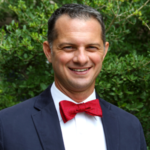 Jon Singletary, PhD, MSW, MDiv, is dean and professor of the Diana R. Garland School of Social Work at Baylor University. He has served on faculty at Baylor since 2003. His wife teaches at Hillcrest PDS in Waco ISD and their children attend the Atlas Academy at Tennyson Middle School and Waco High School.
Jon Singletary, PhD, MSW, MDiv, is dean and professor of the Diana R. Garland School of Social Work at Baylor University. He has served on faculty at Baylor since 2003. His wife teaches at Hillcrest PDS in Waco ISD and their children attend the Atlas Academy at Tennyson Middle School and Waco High School.
(Para leer este artículo en español, haz clic aquí.)
By Jaime Carias
Over the past decade, I have had the honor and privilege of working with parents across the country from all walks of life. Working with parents at different schools and community centers has impacted my outlook on family engagement. Every experience in my line of work has reinforced my belief in the importance of parent engagement during their children’s K-12 educational journey. The earlier that we work with parents to demonstrate the value that they bring to the educational success of their children, the better chance we have at keeping them engaged.
Parents always ask me, “Mr. Carias who do you like to work with the most? Our children, their teachers, or us parents?” To which I reply, “I enjoy working with everyone.” In order for our children to succeed in and out of the classroom and pursue a college education, all three teams: students, parents, and teachers need to work collaboratively and not against each other. Communication is key towards establishing trust amongst all three teams. Parents continue to ask me, “but if you had to choose one group to work with who would you choose?” When asked that question again (it has happened multiple times) I can’t help but stop and look at the parents asking me this question. The answer is simple: I enjoy working with parents. I am a firm believer that student success begins at home, and I have made it my personal commitment to work with parents across the country to help change the toxic narrative that parents do not care to be involved. For so many years this false narrative has hindered underrepresented communities and students of color by being portrayed as disinterested in education. Instead, educators need to create opportunities for parents to become involved. Most importantly, educators must help parents understand the value that being involved brings to their children’s personal, academic, and professional success.
In our book “Buscando Vida, Encontrando Exito: La Fuerza de La Cultura Latina en la Educacion” (Accomplishing Success: Supporting Our Children with The Power of Culture) we highlight the journey and obstacles parents encounter when discussing educational success, educational goals, college enrollment, and career paths with their children. It’s not unusual for low-income families to fail to understand why their sons or daughters might want to go away for college. Our book is a practical guide meant to help parents understand how to become proactive advocates in their children’s educational journey. The influence of family on a student’s college-going decision is huge. Other times, parents are not involved at all and the student is left on their own to make very difficult decisions. Through our research, we have discovered that parents want their children to succeed in school, yet very few of them fully comprehend the role that they play in helping their children fulfill that vision. In my presentations, I seek to change this narrative. I focus on having parents understand the value of developing growth mindsets to create college-going cultures in their homes. Changing the narrative from a fixed-mindset to a growth-mindset allows parents to understand the value of continuous learning and family engagement. As educators, we have to develop culturally competent programming for parents of color so that they can feel welcome and can actively participate in the K-12 school system.
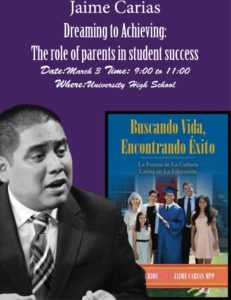 I am very excited to visit Waco ISD for student and parent programming. As a first-generation college student who was born and raised in South Central Los Angeles by Guatemalan parents, I understand the struggle and journey of the students and parents I will be serving this week in WISD. Collectively we will continue to work together to provide the opportunities parents seek for their children. Our children need to thrive and not just survive in the world of the 21st century. We need to remember that it all starts at home, as we move forward and develop student and parent programming. We are all equally invested in the future success of our youth; educators and parents need to collectively work together towards that common goal. I look forward to meeting everyone in the WISD.
I am very excited to visit Waco ISD for student and parent programming. As a first-generation college student who was born and raised in South Central Los Angeles by Guatemalan parents, I understand the struggle and journey of the students and parents I will be serving this week in WISD. Collectively we will continue to work together to provide the opportunities parents seek for their children. Our children need to thrive and not just survive in the world of the 21st century. We need to remember that it all starts at home, as we move forward and develop student and parent programming. We are all equally invested in the future success of our youth; educators and parents need to collectively work together towards that common goal. I look forward to meeting everyone in the WISD.
 Jaime Carias was born and raised in the low-income community of South Central Los Angeles to Guatemalan immigrant parents and has dedicated his entire career to helping young people and parents seek better opportunities in school and in life. Carias has been featured on several national and local media outlets for his work developing educational and community-engaging programs aimed at creating access to higher education and empowering underserved communities across the country like his.
Jaime Carias was born and raised in the low-income community of South Central Los Angeles to Guatemalan immigrant parents and has dedicated his entire career to helping young people and parents seek better opportunities in school and in life. Carias has been featured on several national and local media outlets for his work developing educational and community-engaging programs aimed at creating access to higher education and empowering underserved communities across the country like his.
(To read this post in English, Click here. )
Por Jaime Carias
Durante la última década, he tenido el honor y el privilegio de trabajar con padres por todo el país que vienen de todos los caminos de la vida. Trabajando con los padres en diferentes escuelas y centros comunitarios ha impactado mi perspectiva sobre la participación familiar. Cada experiencia en mi línea de trabajo ha reforzado mi creencia en la importancia de la participación de los padres durante el viaje educativo K-12 de sus hijos. Entre mas pronto trabajemos con los padres para demostrar el valor que aportan al éxito educativo de sus hijos, mas posibilidad tenemos para mantenerlos comprometidos.
Los padres siempre me preguntan, “Sr. Carias, ¿con quién le gusta trabajar más? ¿Con nuestros hijos, con los maestros, o con nosotros los padres?” A lo que les respondo: “Me gusta trabajar con todos.” Para que nuestros hijos tengan éxito dentro y fuera del salón y persigan una educación universitaria, los tres equipos: los estudiantes, los padres y los maestros necesitan que trabajar en colaboración y no uno contra el otro. La comunicación es clave para establecer la confianza entre los tres equipos. Los padres continúan a preguntarme, “Pero si tuvieras que elegir un grupo con quien trabajar, ¿a quién elegirías?” Cuando me preguntan esa pregunta nuevamente (que ha sucedido varias veces) no puedo evitar pararme y mirar a los padres que me están preguntando. La respuesta es simple: me gusta trabajar con los padres. Creo firmemente que el éxito estudiantil comienza en la casa, y me he comprometido personalmente a trabajar con los padres de todo el país para ayudar a cambiar la narrativa tóxica que a los padres no les importa participar en la educación de sus hijos. Durante muchos años, esta narrativa falsa ha obstaculizado a las comunidades de color, al ser retratadas como comunidades desinteresadas en la educación formal. En cambio, los educadores necesitan que crear oportunidades para que los padres participen. Aun más importante, es que los educadores deben de ayudar a los padres comprender el valor que ser involucrados le inculca al éxito personal, académico y profesional de sus hijos.
En nuestro libro “Buscando Vida, Encontrando Éxito: La Fuerza de la Cultura Latina en la Educación”, destacamos el viaje y los obstáculos que enfrentan los padres cuando hablan sobre el éxito educativo, la matriculación universitaria, y las trayectorias profesionales con los hijos. No es inusual que las familias de bajos ingresos no comprendan la razón por la cual los hijos o hijas se salen de la casa para asistir la universidad. Nuestro libro es una guía práctica para ayudar a los padres a entender cómo convertirse en partidarios proactivos en el camino educativo de sus hijos. La influencia de la familia en la decisión de asistir la universidad es enorme para los estudiantes. Otras veces, los padres no participan y el estudiante se queda solo para tomar estas decisiones tan difíciles. A través de nuestras investigaciones, hemos descubierto que los padres quieren que sus hijos tengan éxito en la escuela. Sin embargo, muy pocos de ellos comprenden el papel que juegan en cumplir esta visión con sus hijos. En mis presentaciones, busco cambiar esta narrativa. Me enfoco en convencer a los padres sobre el valor de desarrollar una mentalidad de crecimiento para crear culturas universitarias en sus hogares. Cambiar la narrativa de una mentalidad fija a una mentalidad de crecimiento permite a los padres comprender el valor del aprendizaje continuo y la participación familiar. Como educadores, tenemos que desarrollar una programación culturalmente competente para los padres de color para que se sientan bienvenidos y puedan participar activamente en el sistema escolar K-12.
 Estoy muy emocionado por mi visita al distrito Waco, donde entregare mi programación para padres y estudiantes. Como estudiante universitario de primera generación que nació y se crió en South Central Los Ángeles por padres de Guatemala, entiendo la lucha y viaje de los estudiantes y los padres que voy a servir esta semana en el distrito Waco. Continuaremos a trabajando juntos para brindar las oportunidades de éxito que los padres buscan para sus hijos. Nuestros hijos necesitan prosperar y no solo sobrevivir en el mundo del siglo 21. Mientras los educadores desarrollan programación para los padres y estudiantes, debemos de acordarnos que todo empieza en la casa. Todos estamos igualmente invertidos en el futuro éxito de nuestra juventud; los educadores y los padres deben de trabajar juntos para alcanzar ese objetivo común. Espero conocer a todos durante mi visita al distrito Waco.
Estoy muy emocionado por mi visita al distrito Waco, donde entregare mi programación para padres y estudiantes. Como estudiante universitario de primera generación que nació y se crió en South Central Los Ángeles por padres de Guatemala, entiendo la lucha y viaje de los estudiantes y los padres que voy a servir esta semana en el distrito Waco. Continuaremos a trabajando juntos para brindar las oportunidades de éxito que los padres buscan para sus hijos. Nuestros hijos necesitan prosperar y no solo sobrevivir en el mundo del siglo 21. Mientras los educadores desarrollan programación para los padres y estudiantes, debemos de acordarnos que todo empieza en la casa. Todos estamos igualmente invertidos en el futuro éxito de nuestra juventud; los educadores y los padres deben de trabajar juntos para alcanzar ese objetivo común. Espero conocer a todos durante mi visita al distrito Waco.
 Jaime Carias nació y fue criado en el Sur Centro de Los Angeles por dos inmigrantes Guatemaltecos. Ha dedicado toda su carrera a ayudar a jóvenes y padres en la búsqueda de mejores oportunidades en la escuela y en la vida. Carias ha aparecido en varios medios de comunicación nacionales y locales por su trabajo en el desarrollo de programas educativos y programas de comunidad que crean acceso a la educación superior y apodera a las comunidades desatendidas en este país.
Jaime Carias nació y fue criado en el Sur Centro de Los Angeles por dos inmigrantes Guatemaltecos. Ha dedicado toda su carrera a ayudar a jóvenes y padres en la búsqueda de mejores oportunidades en la escuela y en la vida. Carias ha aparecido en varios medios de comunicación nacionales y locales por su trabajo en el desarrollo de programas educativos y programas de comunidad que crean acceso a la educación superior y apodera a las comunidades desatendidas en este país.
By Hannah Rigg
A neighborhood school. Each morning children are dropped off at the front entrance of Brook Avenue Elementary School and personally greeted by Brook Avenue staff as they make their way to their classrooms. Each afternoon, those same families are congregated outside of the school waiting to walk home with their children. This is what a neighborhood school looks like.
Brook Avenue is in the second year under the leadership of Principal Sarah Pedrotti and Assistant Principal Jessica Torres. They are faced with the challenge of leading Brook Avenue out of the Improvement Required status as set by Texas Education Agency (TEA). You may have read recently that Brook Avenue is one of the five Waco ISD campuses that is at risk of closure at the end of the 2017-2018 school year. Although the threat of closure is one reality, excellence is the reality that Brook Avenue is living into. To ensure excellence, it will take the full dedication of this Waco community.
In the three full months that I have been working at Brook Avenue, I have experienced a transformed campus. Students are provided with opportunities to improve their reading skills through CIS groups, Kids Hope USA mentors, and literacy groups with staff. Students receive a book on their birthday.
When students miss class, they miss instruction time with their teacher and classroom engagement. We need our students in the classroom actively engaging in the work they are completing to ensure increased test scores. At Brook Avenue, attendance is rewarded at each six-week period in order to encourage students to come to school consistently.
Communication between the school and community has increased, and so has the level of involvement.
Brook Avenue is redefining itself as a neighborhood school where families and community members are invited onto campus. The first Tuesday of each month you will find a group of parents gathered in the lunchroom for Coffee and Conversations. The November meeting was filled with determination as parents refuse to allow Brook Avenue to fall below standards for another consecutive year. Every parent in attendance signed up to volunteer to read with students or to support teachers by completing preparation activities.
As Brook Avenue continues to work towards success, they are creatively supported by their new staff provided by the Texas Title I Priority Schools (TTIPS) Grant, Columbus Avenue Baptist Church (Kids Hope USA Mentors), Communities in Schools (CIS), Klaras Center for Families, and the BEAR (Be Emotionally Aware and Responsive) Project. Each agency has responded zealously to the call for improvement this school year.
The TTIPS grant has allowed Brook Avenue to become a campus of innovation. Initiated by parents and funded by the TTIPS Grant, an outdoor classroom will be created in the back of the school allowing teachers to uniquely engage their students during lessons. And, a Maker’s Space allows students to utilize creativity as they bring their learning to life. The TTIPS grant made it possible to purchase one iPad for each student to promote technological learning. It also heled support non-traditional seating options for classrooms so that the classroom can be arranged to better suit the learning styles of the children. The grant has also enabled additional learning trips for all students. These trips give students an opportunity to make connections between their classroom learning and hands on real-world experience. As a campus, we are honored that the state has recognized Brook Avenue as a priority for receiving this funding and it is essential that our community recognize Brook Avenue as a priority as well.
Look for the hashtag #BrAveLearns on Twitter, Instagram, and Facebook throughout the year as we watch Brook Avenue achieve success. Our students are learning, our teachers are engaging, and our community is behind us. The next time you see Brook Avenue Elementary School in the news, look for their accomplishments.
 Hannah Rigg is a student in the Diana R. Garland School of Social Work and serves as a social work intern on campus at Brook Avenue and West Avenue Elementary Schools through the BEAR Project. She has been living in Waco for two years and loves exploring this city.
Hannah Rigg is a student in the Diana R. Garland School of Social Work and serves as a social work intern on campus at Brook Avenue and West Avenue Elementary Schools through the BEAR Project. She has been living in Waco for two years and loves exploring this city.
By Matthew Polk
Last school year, more than 2,000 Waco ISD students missed at least 17 school days (10% of the school year). Students who miss 10% or more of school in a year are referred to as “chronically absent.” On average, chronically absent students make lower grades, perform worse on standardized tests, and are less likely to pass their classes and graduate than students with better attendance. Most parents don’t realize that missing just two days a month throughout the year makes a student chronically absent and puts them at risk for academic struggles.
The famous movie director Woody Allen is often quoted as saying, “80% of success is showing up.” This statement is pretty true for success in school! It’s obvious that when students aren’t in school, it is hard for them to learn. And we know that students who attend school more often do better on average than those who are chronically absent. This means that one of the most effective (and easiest!) ways that parents can help their children be successful in school is just to make sure that they show up!
But there’s another reason why it’s important for students to be in school: MONEY. Many people don’t know that public schools in Texas receive state funding based on how often students attend school. This financing system is called Average Daily Attendance (or ADA) funding. For every day that a student misses school, Waco ISD loses at least $30 in state funding. Adding up all the school days missed by Waco ISD students last year, we calculate that Waco ISD lost out on at least $2 million in state funding.
Parents and the community usually have a wish list of things they’d like the school district to provide: more arts classes, more counselors and tutors, more afterschool programs, etc. Imagine how many things on that wish list could be done with $2 million. When students attend school, they are not only more successful—they also earn state funding that is used to make their school experience better. That’s a win-win situation for students and the school district.
How do we improve school attendance for Waco ISD students? It’s what we would call a “collective impact” approach—many partners being a piece of the puzzle. Some collective impact projects work with health care providers for mobile clinics and public awareness campaigns. Additionally, when healthcare providers arrange for same-day appointments for sick children first thing in the morning, children get the care they need and then they can go back to the classroom. When follow-up appointments are scheduled after attendance is taken for the day, students can start the day at school, be counted present, and return with an excuse for the missed class time.
Some collective impact projects provide mentors for students and families of chronically absent students. They engage local churches and organizations to assist their members when problems arise with getting students to school. Other collective impact efforts work to eliminate social and emotional reasons for chronic absenteeism such as substance abuse in the home or homelessness. There are many ways for Wacoans to get involved and assist Waco ISD with chronic absenteeism. If schools, families, and community partners all focus on improving student attendance, we can make it happen.
For information about getting involved in the collective impact work to prevent chronic absenteeism in Waco ISD contact me at Prosper Waco, 254-741-0081, or Dr. Robin McDurham at Waco ISD, 254-755-9601.
 This Act Locally Waco Blog post was written by Matthew Polk. Matthew is Executive Director of Prosper Waco. Prior to that, he served as Superintendent of Rapoport Academy Public School. He and his wife attended Baylor, and after spending a few years in the northeast, they returned to Waco to raise their family. They have four children, ages 10 to 2 years old. You can contact him at [email protected].
This Act Locally Waco Blog post was written by Matthew Polk. Matthew is Executive Director of Prosper Waco. Prior to that, he served as Superintendent of Rapoport Academy Public School. He and his wife attended Baylor, and after spending a few years in the northeast, they returned to Waco to raise their family. They have four children, ages 10 to 2 years old. You can contact him at [email protected].
The Act Locally Waco blog publishes posts with a connection to these aspirations for Waco. If you are interested in writing for the Act Locally Waco Blog, please email [email protected] for more information.
(During December we will be reprising some of “2017’s greatest hits” from the Act Locally Waco blog. I couldn’t possibly pick my favorites – so I used the simple (cop out?) approach of pulling up the 10 blog posts that got the most “opens” according to our Google Analytics. It is an intriguing collection that gives at least a little insight into the interests and concerns of Act Locally Waco readers. I hope this “Top 10” idea inspires you to go back and re-read your personal favorites. There have been so many terrific ones… If you would like to see the Top 10 according to Google Analytics, here’s the link: 2017 Greatest Hits. Merry Christmas! — ABT)
By Andre’ Watkins
Growing up in Waco, Texas, gives you a certain kind of insight. Waco is a mid-sized community that allows its citizens the distinct opportunity to experience all of the levels of socioeconomic strata with ease. Just take a ride down Colcord Ave. You will see the homes of the very affluent and the homes of the desolately hopeless on the same block. This is my Waco.
This Waco has a long history. During the 60’s and 70’s, Waco participated in a federal program called “Urban Renewal” meant to improve blighted areas of town. Under this program (called “Urban Removal” by those who questioned its value) entire family units were removed from neighborhoods where they had built and maintained homes and raised families. Those who remained were expected to pull themselves up by their proverbial bootstraps, which proved to be a difficult task.
Around the mid-eighties, crack cocaine ripped through my beloved city on a euphoric rampage. Crack took from the rich and poor alike. This gruesome drug fueled demon was never a black or white problem. It was a drug addiction problem.
Crack cocaine changed the landscape of Waco. Middle-class families fled to the suburbs. Neighborhood stores closed. Restaurants and grocery retailers were boarded up. This left a power vacuum in the inner city of Waco that attracted crime and despair.
A chasm opened up between the people who left and the often impoverished people who remained. Waco ISD finds itself in the position of needing to bridge this chasm. To bridge this chasm we have to be honest with ourselves: very often there is a serious disconnect between the community we serve as a school district and the service providers that work in our schools.
To address this situation we have to deal with some hard questions: How do we expect people to model their behavior after the behavior of those who left them to languish in lack? Why should I as an impoverished person seek to exemplify a lifestyle of a person or people who won’t even come to my neighborhood? Do you really care about me? Or am I a charity case or pet project?
Realizing this disconnect, we knew that we had to switch up the flow. To combat this monster of our own creation, we began to search for methods that other school districts were utilizing successfully.
Restorative Discipline just seemed to jump off of the pages of training manuals and speak directly to the heart of our issues here in Waco ISD.
To quote from the website of Life Anew, a non-profit in Austin that brings restorative practices into local community schools, “Restorative processes create a space where students and adults can develop empathy, respect and common values by listening and learning from one another. This process helps to increase the effectiveness of instruction time, build community and develop students socially and emotionally.”
At the heart of Restorative Discipline Practices, we find a tradition as ancient as the campfire circles of old, the Intentional Conversation. Intentional Conversations are simply focused discussions that seek to determine the root cause of an exhibited behavior.
We acknowledge the truth in the statement made by Sherwynn Patton, Executive Director of Life Anew, “Adverse behavior is just the smoke; when we find the reasons for the behavior, we locate the source, the fire.” We had been spending too much time putting the waters of our logic and education on the smoke. We never dug deep enough with our conversation skills and listening hearts to determine the location of the fires in our precious students’ souls.
As we began to have Intentional Conversations together as staff at Waco High, we began to seek and find our similarities as PEOPLE and to break down our cultural bias. We then began to spread this infection of emotional affection for the staff through the students into our community. Waco High dropped its rate of suspension by 46% in two years of Restorative Practices implementation. I don’t care who you are or where you are from – That is impressive! We celebrate and invite our community at large to join us in repairing harm and establishing community unity.
 Andre’ E. Watkins is a Restorative Discipline Facilitator at Waco High School. He has 16 years of experience working with at risk youth and their families including serving as Detention Supervisor at Bill Logue Juvenile Justice Center and a Training Officer at McLennan County Challenge Academy. He was a Dorm Supervisor at TYC Mart, and is the only person in the State of Texas to be promoted from JCO 1 to JCO 5 in 30 days. He volunteers at the Doris Miller YMCA, as a Prosper Waco Community Engagement Committee Member and as a Football and Basketball Coach for the Waco Eagles. He is also a Park Ranger for the City of Waco.
Andre’ E. Watkins is a Restorative Discipline Facilitator at Waco High School. He has 16 years of experience working with at risk youth and their families including serving as Detention Supervisor at Bill Logue Juvenile Justice Center and a Training Officer at McLennan County Challenge Academy. He was a Dorm Supervisor at TYC Mart, and is the only person in the State of Texas to be promoted from JCO 1 to JCO 5 in 30 days. He volunteers at the Doris Miller YMCA, as a Prosper Waco Community Engagement Committee Member and as a Football and Basketball Coach for the Waco Eagles. He is also a Park Ranger for the City of Waco.
The Act Locally Waco blog publishes posts with a connection to these aspirations for Waco. If you are interested in writing for the Act Locally Waco Blog, please email [email protected] for more information.
(A follow-up to https://actlocallywaco.org/2016/07/19/service-learning-at-indian-spring-helping-kids-learn-to-be-citizens/)
By Travis Cheatham
Last July I wrote a blog about what service learning looks like at Indian Spring Middle School (ISMS). I explained the structure, the value, and the potential of the program. Today I write about the rewards, challenges, and opportunities of this last year through a few stories. (Names have been changed to protect student identities)
Rewards
Ava is a good student in class but she’s the queen of eye rolling. Throughout the year, I frequently had to coax Ava to get to her service learning group, which ironically she liked, but for some reason, she frequently dawdled in attending. This, by the way, is a common theme among students and is really a fact of life for middle schoolers.
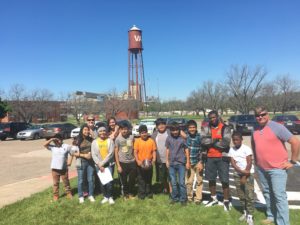 In March, our school planned an event with the VA Medical Center thanks to funds from The Meadows Foundation. Our students decided to use the funds to donate plants, games, and activities for VA residents. Ava was sure to help out with all of the last minute preparations and came to the event on a Saturday morning, no less. The following Monday morning, I was poised at the school’s main entrance to greet students (as I usually do) and Ava came running up to tell me how great a time she had. She then asked if there was any way that she could go back on her own to meet with residents.
In March, our school planned an event with the VA Medical Center thanks to funds from The Meadows Foundation. Our students decided to use the funds to donate plants, games, and activities for VA residents. Ava was sure to help out with all of the last minute preparations and came to the event on a Saturday morning, no less. The following Monday morning, I was poised at the school’s main entrance to greet students (as I usually do) and Ava came running up to tell me how great a time she had. She then asked if there was any way that she could go back on her own to meet with residents.
The lesson: Are you sharing power with your child, mentee, or student? They will relish it and will thrive. I never see our students more fulfilled at school than when they are given a task to perform. Our students have power, talent, and desire, but we have to activate it. In this next year, I hope to have more opportunities to empower our students.
Challenges
“Everyone knows service learning is boring; you’re wasting your time.” This was a common greeting from Tim as I corralled students to get to their service learning groups. I’d love to say that Tim was alone in this belief, but he wasn’t. Last year, our goal was to place all 6th and 7th graders in a service learning group based on surveys of their interests. By the time students met in their first service learning group many were confused about why they were there (even though I spent a week prepping the students).
Although middle schoolers’ decisions are inherently confusing (even to themselves), forcing students to go to something that they have no stake in is an act in vain. With no grades or requirements, our program really depended on a good hook for students’ interest and sometimes the gradual development of interest.
The lesson: This next year students will attend a service learning fair and sign up for any groups they are interested in. If they’re not interested there will be no arm twisting, but we will require students to at least take a look at their options.
Opportunities
“Hey Mike, I’m just calling to …let you know we need to cancel tomorrow due to ______
…remind you that I need you to turn in paperwork for last week’s outline
…apologize for the delay in setting up the field trip, could you do it on …”
The lesson: Although program flexibility is great, universal policies make for a well-oiled machine. As I look at the future sustainability of the service learning program I need to refine a model that can be easily administered and replicated.
How can you help?
Become a facilitator! Facilitators meet with students 1-2 hours once a week throughout the school year to guide the students in developing service projects. This year we hope to use your passions as a volunteer as the springboard for connecting students. Training will start mid-August and the program should start mid-September.
One More Good Story
Every month throughout the school year I would hold a roundtable meeting for all of our service learning facilitators to talk about upcoming events, how things were going, and to provide ongoing training. My favorite part: listening.
I’m under no delusion that I am a master of anything; do you want to know the good news for volunteers? You don’t have to be either! In those discussions, even our facilitators who were not veterans of the program contributed in a way that generated new ideas for the whole group. Those sessions produced innovative and self-critical observations which are essential for fostering real growth both individually and as a program. I am incredibly thankful for the work of my awesome volunteers and cheerleaders of this program.
Not ready to jump in? Give me a call or email and I’ll let you know about other ways to get connected at ISMS. You can also visit our website at http://indianspring.wacoisd.org/cms/One.aspx?portalId=13246&pageId=424889
to learn more about our service learning program or http://www.prosperwaco.org/mentor-coalition/ to see other ways you can mentor students in Central Texas.
 Travis Cheatham is the Service Learning Manager for Indian Spring Middle School. Before ISMS, Travis was the Executive Assistant at Mission Waco and helped lead a culinary class with the MPowerment job development program. Travis is also the Chef/Owner of Cuppa, Waco, TX a catering and food consulting business that was a regular at the farmers market in 2015. Travis is a ’06 Baylor grad who loves this community and loves to travel with his wife, Amy, whenever possible.
Travis Cheatham is the Service Learning Manager for Indian Spring Middle School. Before ISMS, Travis was the Executive Assistant at Mission Waco and helped lead a culinary class with the MPowerment job development program. Travis is also the Chef/Owner of Cuppa, Waco, TX a catering and food consulting business that was a regular at the farmers market in 2015. Travis is a ’06 Baylor grad who loves this community and loves to travel with his wife, Amy, whenever possible.
The Act Locally Waco blog publishes posts with a connection to these aspirations for Waco. If you are interested in writing for the Act Locally Waco Blog, please email [email protected] for more information.
